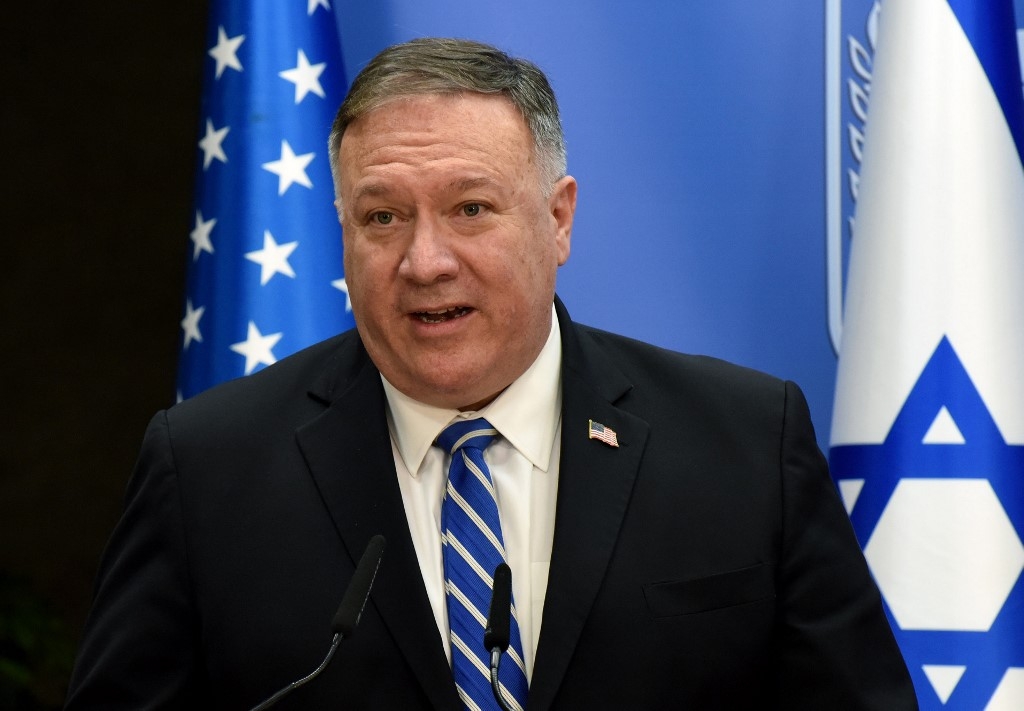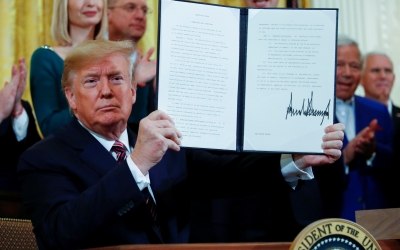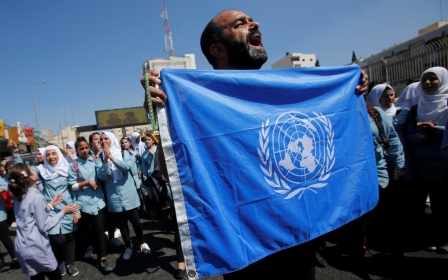Groups critical of Israel to be branded 'antisemitic' under Pompeo plan: Report

The US State Department is expected to announce plans to create a new governmental process that would officially designate some groups, including NGOs and human rights organisations, as antisemitic.
Secretary of State Mike Pompeo has reportedly decided to establish the mechanism and is expected to make the announcement soon, but three people familiar with the issue told Politico that he could still change his mind and hold off on making such plans public.
New MEE newsletter: Jerusalem Dispatch
Sign up to get the latest insights and analysis on Israel-Palestine, alongside Turkey Unpacked and other MEE newsletters
So far, which groups would be classified as antisemitic is unclear, but Politico reported Pompeo had been considering for months whether to label Amnesty International, Human Rights Watch (HRW) and Oxfam under the proposed process amid their criticism of the Israeli government's human rights violations.
If created, groups designated antisemitic would lose any US government support - financially or otherwise - with the State Department potentially urging other governments to follow suit.
So far, the yet-to-be-released proposal has drawn "fierce internal pushback" within the State Department, Politico reported, as well as condemnation from legislators.
The State Department did not reply to Middle East Eye's request for comment by the time of this article's publication.
'These groups defend human rights'
If the State Department follows through on creating the mechanism it could very well be scrapped once President-elect Joe Biden takes office in January.
When first reported in October, Democratic Congressman Jamie Raskin warned against the idea, calling it "dangerous".
"These groups defend human rights, freedom & tolerance for all," Raskin said on Twitter at the time.
Those objecting to the idea warned that such a process may have chilling effects on freedom of speech and would likely open the door to litigation.
There are also concerns that such a move could embolden dictators and other world leaders to crack down on human rights organisations, among others.
Egypt has already passed several laws that restrict human rights groups including HRW and Amnesty International and has imprisoned and deported rights advocates. The governments of Venezuala and Iran have also expelled HRW staff, among other civil society advocates.
Last year, Israel deported HRW's Israel and Palestine Director, Omar Shakir, for his work, and in October it stopped granting any visas to employees at the United Nations’ human rights agency, effectively forcing the body’s top staff to leave.
Defining antisemitism to target BDS
If implemented, the proposed US process of designating rights groups as antisemitic would likely rely on the controversial definition created by the International Holocaust Remembrance Alliance (IHRA), that has in the past come under fire as an overly broad definition that conflates criticism of Israel with antisemitism.
Palestinian rights advocates in particular have long rejected IHRA's definition, saying that it would be employed to censor speech critical of Israel's political policies.
Some interpretations of the IHRA definition argue that groups should be declared antisemitic if they support the Boycott, Divestment and Sanctions movement, which urges individuals, companies and countries to hold Israel accountable for its human rights violations.
While the BDS movement has seen increasing popularity among college students and is supported by the Black Lives Matter movement, among other social justice groups, some states have already passed anti-BDS laws that use the IHRA definition to define such speech as discriminatory.
Last year, US President Donald Trump signed an executive order adopting the IHRA definition in an extension to current anti-discrimination civil rights laws at the Department of Education to cover Judaism, stating in no ambiguous terms that the executive order targeted the BDS movement.
At the time, Israeli leaders praised the move, which was largely seen as another favour to America's ally.
Middle East Eye delivers independent and unrivalled coverage and analysis of the Middle East, North Africa and beyond. To learn more about republishing this content and the associated fees, please fill out this form. More about MEE can be found here.







